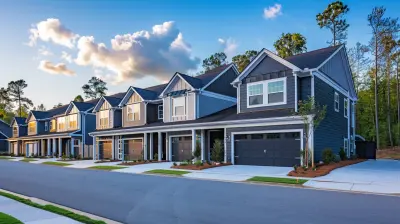Why Affordable Housing Should Be a Priority in City Planning
18 June 2025
Affordable housing is more than just a necessity—it's a cornerstone of a thriving, sustainable city. Yet, in many urban areas, skyrocketing rents and home prices have pushed working-class families and individuals to the outskirts or, worse, into homelessness. The question is, why isn’t affordable housing the top priority in city planning?
In this article, we’ll dive deep into why affordable housing should be at the forefront of urban development, how it benefits cities, and what needs to change to make it happen.
The Growing Housing Crisis: A Reality Check
Let’s face it—housing costs are out of control. Wages haven't kept up with inflation, and the cost of living continues to rise. Many people are spending well over 30% of their income on housing, the threshold for what’s considered “affordable.”But affordability isn’t just an issue for low-income families. Middle-class workers—teachers, nurses, firefighters—are also feeling the squeeze. If the people who keep our cities running can’t afford to live there, we’ve got a serious problem.
Why Affordable Housing Matters More Than Ever
So, why should city planners focus on making housing more affordable? The answer is simple—because it benefits everyone. Here’s why:1. Reducing Homelessness and Housing Instability
Lack of affordable housing is one of the leading causes of homelessness. Without it, people are forced to choose between paying rent, buying groceries, or covering medical bills. And in extreme cases, they end up living on the streets. Providing more affordable homes means fewer people struggling to keep a roof over their heads.2. Strengthening the Local Economy
Affordable housing isn’t just good for residents—it’s good for business, too. When people aren’t spending the majority of their income on rent, they have more disposable income to put back into the local economy. They can support small businesses, attract new employers, and help boost economic growth.3. Creating More Diverse, Inclusive Communities
Cities thrive on diversity. When housing is only available to the wealthy, cities become segregated by income, pushing lower- and middle-income workers out. Affordable housing ensures that people from different backgrounds, professions, and income levels can coexist, creating a richer, more vibrant community.4. Reducing Traffic and Environmental Impact
When people can’t afford to live close to where they work, they’re forced into long commutes. This means more cars on the road, more traffic congestion, and higher pollution levels. Building affordable housing in central areas helps cut down on commuting time, reduces carbon emissions, and leads to a more sustainable urban environment.5. Improving Public Health and Well-being
The stress of unaffordable housing can have devastating effects on mental and physical health. Families living in overcrowded or substandard conditions are at greater risk of illness, stress-related disorders, and even lower life expectancy. A safe, stable, and affordable home is the foundation for a healthier, happier life.
What’s Stopping Cities from Prioritizing Affordable Housing?
Despite its importance, affordable housing often takes a backseat in city planning. But why? Here are some common roadblocks:1. High Land and Construction Costs
Land in prime urban areas is expensive, and developers tend to prioritize luxury housing because it offers higher profits. The result? Fewer affordable housing projects and more high-end condos that remain vacant while everyday workers struggle.2. Zoning Laws and Regulations
Zoning laws can make or break affordable housing projects. Some cities have outdated regulations that limit where and how affordable homes can be built. Reducing red tape and updating zoning policies can make it easier to create new affordable housing options.3. NIMBY (Not In My Backyard) Opposition
Many communities resist affordable housing developments, fearing that they will lower property values or bring in "undesirable" groups. This NIMBY mentality only worsens the housing crisis, making it harder for cities to build what’s needed.4. Lack of Government Funding and Incentives
Affordable housing requires investment, but many cities allocate their budgets elsewhere. Without sufficient government funding, tax incentives, or public-private partnerships, building affordable homes remains a slow process.
Solutions: How Cities Can Make Affordable Housing a Priority
The good news? There are solutions. Cities can take proactive steps to ensure housing remains within reach for everyone. Here are a few strategies:1. Update Zoning Laws to Encourage Affordable Housing
Zoning reforms can make it easier for developers to build affordable units. Allowing for mixed-use developments, increasing building heights, and reducing parking requirements can help increase housing supply.2. Provide Incentives for Developers
Governments can encourage developers to build more affordable housing by offering tax breaks, grants, or reduced permit fees. Inclusionary zoning policies, which require developers to set aside a portion of units for lower-income residents, can also help.3. Invest in Public and Nonprofit Housing
Cities should allocate more funds to public housing projects and nonprofit organizations that focus on affordable housing. Partnerships between the public and private sectors can accelerate construction and keep costs manageable.4. Repurpose Vacant and Underutilized Properties
Many cities have vacant buildings or underutilized spaces that could be transformed into housing. Adaptive reuse strategies—like converting old office buildings into apartments—can be a cost-effective way to increase housing stock.5. Address NIMBYism with Community Engagement
Educating communities about the benefits of affordable housing can help combat opposition. Cities should work with residents to address concerns and demonstrate how these developments enhance, rather than harm, neighborhoods.Final Thoughts: Affordable Housing Is a Right, Not a Privilege
Housing isn’t a luxury—it’s a basic human need. If cities want to remain livable, sustainable, and economically stable, they must prioritize affordable housing in their planning efforts.Ignoring the issue only widens the gap between the rich and the poor, increases homelessness, and drives essential workers away. But by taking bold, forward-thinking action, cities can create a future where housing is accessible and equitable for all.
The time for change is now. The question is: Will city planners step up?
all images in this post were generated using AI tools
Category:
Affordable HousingAuthor:

Vincent Clayton
Discussion
rate this article
2 comments
Kieran Gibson
This article beautifully highlights the urgent need for affordable housing in urban development. By prioritizing accessible living spaces, we can foster inclusive communities where everyone has a chance to thrive. Thank you for bringing attention to this vital issue!
June 23, 2025 at 12:20 PM

Vincent Clayton
Thank you for your thoughtful comment! I appreciate your support for affordable housing and its role in building inclusive communities.
Remi Benton
Affordable housing ensures diverse, thriving communities for all.
June 19, 2025 at 3:47 AM

Vincent Clayton
Absolutely! Affordable housing is essential for fostering inclusivity and enriching community life.


